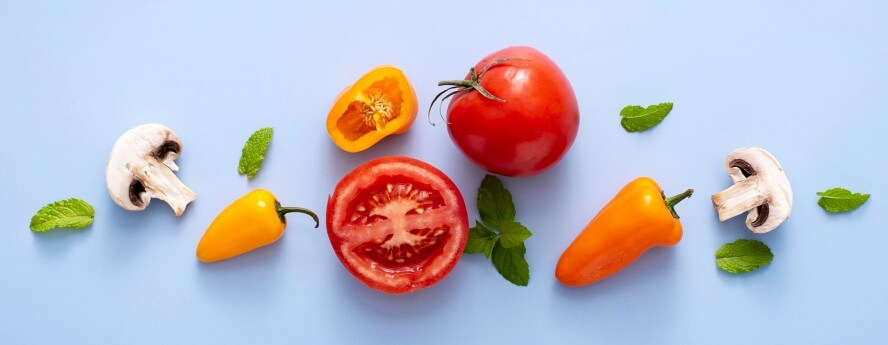
Even though food can’t stop cancer, it has been scientifically proven that an overall healthy diet could reduce the risk of cancer by providing you with the right nutrients and by helping you keep a healthy weight.
There are many food myths around cancer such as claims about individual foods that have the power to stop the growth of cancer, but most of them are not backed up by science and a general healthy diet is much more important in helping you prevent cancer. That’s why we have put together these 5 healthy eating tips to help you lower your chances of getting cancer.
1. Get plenty of fibre
Fibre is an important part of our diet but most of us don’t get enough. Fibre is essential for your digestive health and makes the waste matter (faeces) travel easily through the bowel. Eating plenty of fibre is linked to reducing inflammation in the gut and lowering the risk of bowel cancer. Here are some ways to include more fibre in your diet:
2. Eat at least 5 portions of fruit and vegetables a day
Fruit and vegetables contain vitamins, minerals, fibres and other chemicals (phytochemicals) that may help protect your body from cell damage that can lead to certain cancers. Including at least 5 portions of fruit and vegetables in your diet every day will help you reduce the risk of cancer and obesity (a major risk factor for cancer).
BBC recommends a few ways of making sure you include more fruit and vegetables in your diet:
3. Cut down on processed and red meat
Processed meat (e.g. ham, bacon, sausages, salami) and red meat (e.g. beef, pork, lamb) have chemicals (added during processing or produced when cooking) that can damage cells in the bowel and increase the risk of developing bowel cancer. Processed meat seems to be more dangerous because the scientific evidence is clear about its link with cancer while red meat is classed as a probable cause.
Do you need some help with cutting back on processed and red meats? You could try the following suggestions:
4. Reduce your salt intake
Many people in the UK eat much more salt than the recommended daily intake, which is 6 grams per adult per day. Salt has been found to increase the action of the bacterium Helicobacter pylori which causes 1 in 3 stomach cancers, so reducing salt in your diet can lower the risk of inflammation that can lead to stomach cancer.
Reducing your salt intake is not straightforward, as the majority of salt people consume comes from processed foods rather than the salt added when cooking or at the table. Reading the product labels when shopping for food and choosing low salt versions can be a good way to keep an eye on your salt intake. Some foods high in salt to limit or avoid include:
- Cured meats
- Bread
- Cheese
- Table sauces
5. Cut back on free sugars
There is a belief that cutting sugar out of our diet will prevent or stop cancer because sugar feeds the cancer cells thus helping the cancer grow. While it is true that sugar feeds our cells, including cancer cells, there’s no way to ‘program’ the sugar to reach only the healthy cells and skip the cancer ones. At the same time, our bodies and cells rely on sugar for energy and eliminating sugar from our diet would not be a healthy solution.
However, there is an indirect link between sugar and cancer that can put people with high-sugar intake at a greater risk of cancer. Eating lots of sugar overtime can make you overweight and that alone can increase the risk of developing many types of cancer.
The main concern here is represented by the free sugars and they are the ones you want to reduce. Free sugars are those added in foods and drinks such as sugary drinks, biscuits and chocolate and don’t include the sugar that is naturally found in fruit, milk or healthy starchy foods (wholegrains and pulses). Here are some examples of sugary foods and drinks you should have less of and what you could replace these with:
Although there could be certain foods that have the potential to directly reduce the growth of cancer cells, more research is needed to understand these foods and their connection to cancer. In the meantime, it’s safe to conclude that a general healthy diet along with regular physical activity and giving up smoking are important factors in preventing cancer.
Disclaimer: The content of this website is provided for informational purposes only and does not substitute the medical advice from a healthcare professional.